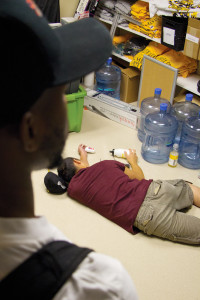Originally published in the Oct. 9, 2014 edition of the Sunflower.
While walking through the sprawling campus sidewalks, it is easy to be blinded by the views around you, masking details that make up life at Wichita State.
Sometimes, those details are not all that pretty — the problems that your neighbor may be facing may not be all that clear.
The Office of Diversity and Inclusion is hosting the Tunnel of Oppression today, an event that highlights some modern day issues of oppression and issues that WSU students may be facing in their own lives.
Participants of the Tunnel of Oppression are led through of where WSU students and staff act out examples of oppression and hate that have been trending, such as bullying, school violence, suicide and domestic abuse in homosexual relationships.
Starting with an ice-breaker, students are invited to write a few derogatory words or phrases on the “hate wall” that they have heard or hear on a regular basis.
At the end of the “tunnel,” participants are given the opportunity to meet with a counselor from the WSU Counseling and Testing Center to debrief and talk about what they had just experienced.
Events such as the Tunnel of Oppression can trigger repressed emotions and experiences in some individuals. Vicarious trauma can also be experienced, with viewers taking on some of the same emotions that are expressed by the presenters.
“The ODI officers asked us to have a few counselors here to debrief this experience in case it did hit home with someone,” Meladee Garst said.
Garst, a psychologist with the Counseling and Testing center, said the Tunnel of Oppression gives students an opportunity to learn an important lesson — the benefit of being aware of their surroundings and acting upon what they see.
“The biggest thing with this event is the conscious awareness,” she said.
“That is the biggest part I want people to walk away with.”
Originally starting out at Western Illinois University in 1993, the Tunnel of Oppression has made appearances as a grassroots program in diversity at colleges and universities around the country. Providing a hands-on opportunity to see results of oppression, abuse, violence and discrimination in the lives around them, some WSU students saw immediate parallels to their own lives.

“The crying, yelling, the restraint — I see it every day,” WSU student Kevin Cullors said.
“It just made it more real — it made [the violence] more every day,” WSU student Amy Norton said.
“I think the whole thing is pretty beneficial, especially the first room where you hear all of those derogatory terms that you hear every day,” WSU student Tanarah Brady said.
Even if students were unable to see a parallel with their own lives, the Tunnel of Oppression did highlight one issue: awareness.
Stressed with each exhibit was the need for awareness on the behalf of each individual. Not only that, but the exhibits showed the results of not speaking up when one notices abuse.
“You need to start speaking up about those kind of things, because they are never going to go away if you don’t,” Brady said.
The Tunnel of Oppression will be held from 11 a.m. to 2 p.m. today, with each tour lasting around 25 minutes. Tours start in RSC 214 and lead through the Office of Diversity and Inclusion, ending with a debriefing.
For more information about the Tunnel of Oppression, call the Office of Diversity and Inclusion at 978-3034. The office will be closed for normal activities during the tours today.
—Kevin Brown/The Sunflower
Featured image caption: Tanarah Brady writes a deragatory phrase on the ‘Hate Wall’ in RSC 214 as a part of the Tunnel of Oppression, an interactive presentation from the Office of Diversity and Inclusion on social issues WSU students face including racism, sexism and domestic violence. (Kevin Brown/The Sunflower)
